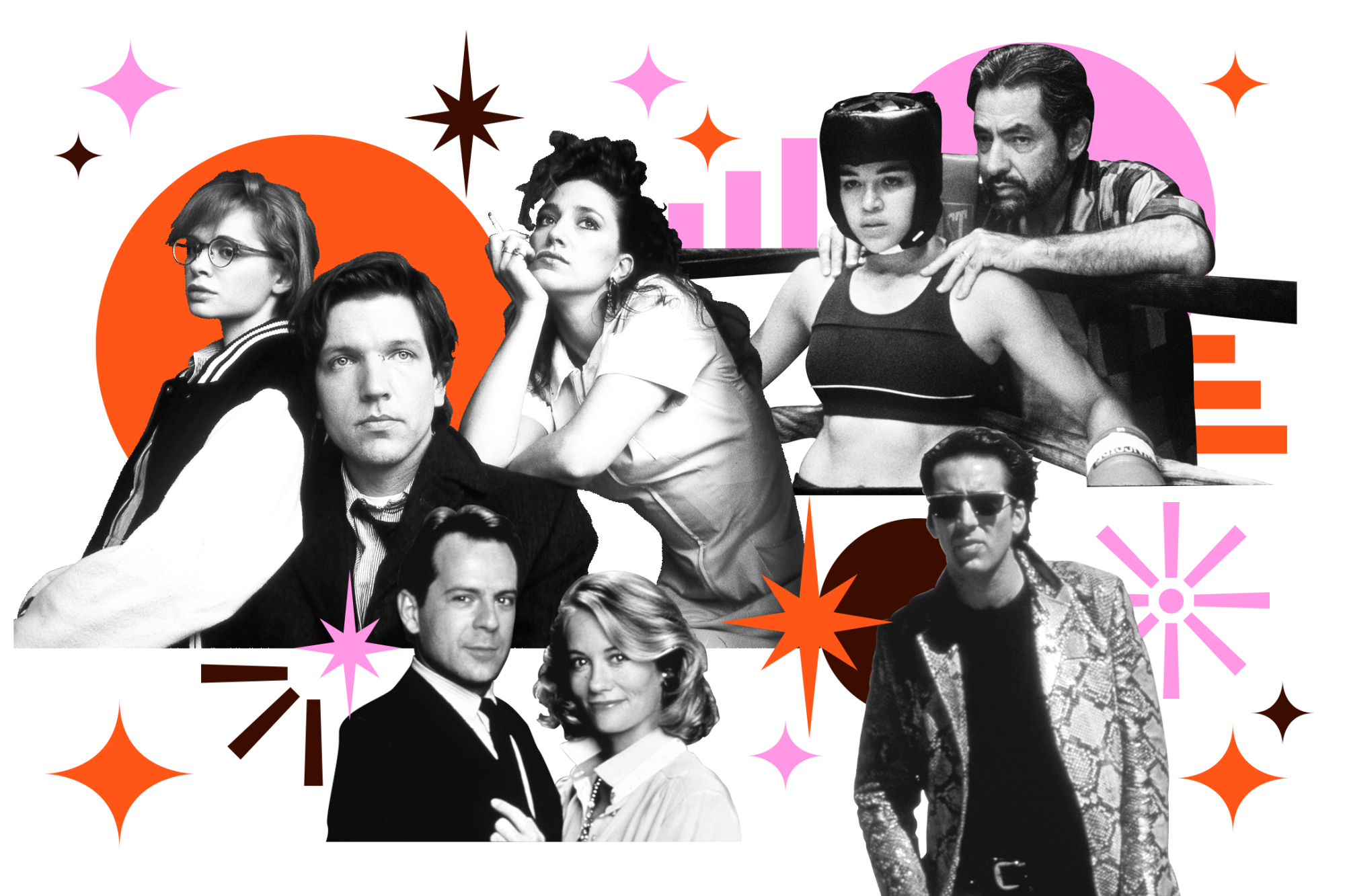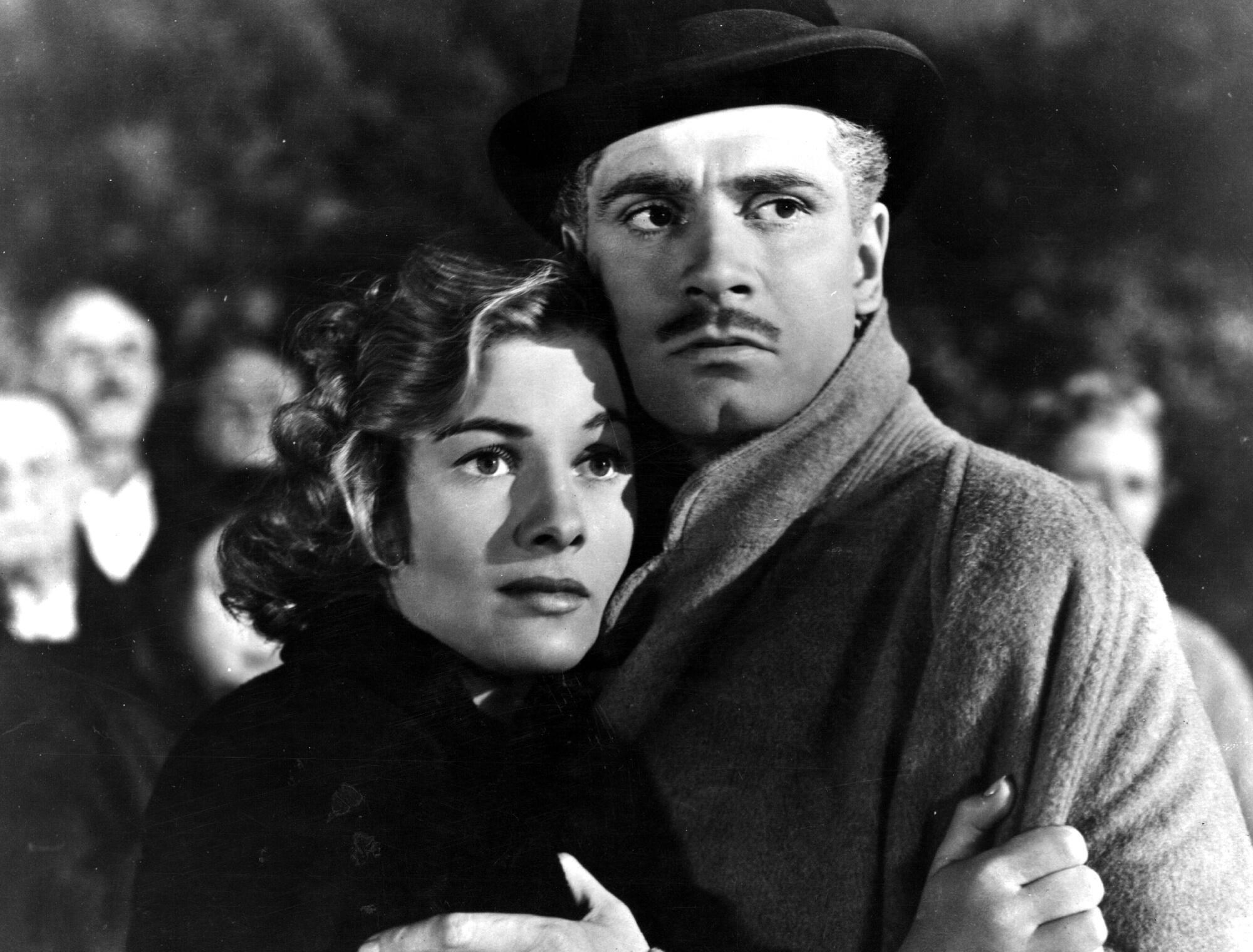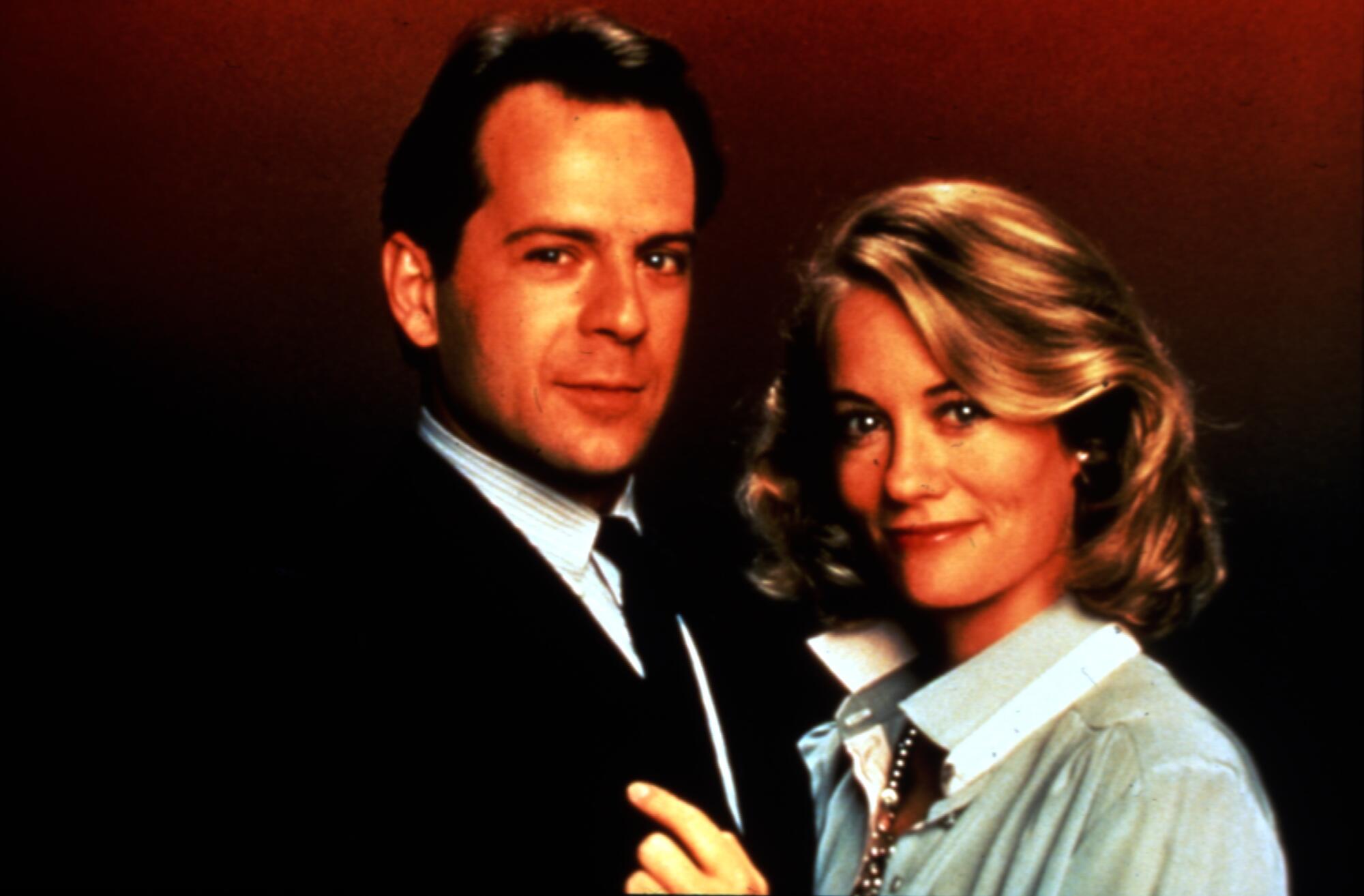
- Share via
The implicit promise of the streaming era is that everything you could possibly want to watch can be accessed in an instant, the endless, all-you-can-eat bounty of Hollywood just a click (and a subscription fee) away.
Try telling that to Glenn Gordon Caron.
A veteran TV producer, Caron created the 1980s detective series “Moonlighting,” which earned critical acclaim and strong ratings in its day for its innovative blend of fourth-wall-breaking screwball comedy, mystery and romance. Over its five-season run, the series pulled in 41 Emmy nominations, influencing many shows that followed and launching a previously all-but-unknown Bruce Willis — whose snappy, sexually charged banter with co-star Cybill Shepard captivated viewers — to megastardom.
But despite years of lobbying by Caron, “Moonlighting” has yet to appear on any streaming platform, held up by the high cost of clearing the rights to the large amount of music used in the show. Caron has felt an even greater sense of urgency since Willis was diagnosed last year with frontotemporal dementia, ending his legendary career.
The complete guide to home viewing
Get Screen Gab for everything about the TV shows and streaming movies everyone’s talking about.
You may occasionally receive promotional content from the Los Angeles Times.
“I’ve been campaigning since about 2005, saying, ‘What can we do to get it back in circulation?’” says Caron. “It’s frustrating — there are bootlegs and stuff on YouTube, but the show has been almost impossible to watch. When I saw that Universal was able to get ‘Miami Vice’ out there — another show that’s larded with music — I thought, ‘Gosh, there’s got to be a way for us to do it.’”
More than a decade into the streaming era, the case of “Moonlighting” is hardly unique. Despite the seemingly infinite sea of content on an ever-expanding array of platforms, many cherished films and TV series remain unavailable to stream, caught in a tangled web of licensing quandaries, rights disputes and ever-shifting corporate strategies.
The list of films absent from the streaming landscape includes classics (Alfred Hitchcock’s 1940 Gothic thriller “Rebecca,” Elaine May’s 1972 rom-com “The Heartbreak Kid”); cult favorites (George Romero’s “Dawn of the Dead,” David Lynch’s “Wild at Heart,” “Pink Floyd: The Wall”) and crowd-pleasers (“The Cannonball Run,” “Cocoon”). Iconic TV shows like “thirtysomething,” “Northern Exposure,” “L.A. Law” and “Homicide: Life on the Streets” are similarly nowhere to be found.
“There are a large number of films that didn’t make the migration from VHS to DVD to Blu-ray to streaming,” says Dennis Doros, who along with his wife, Amy Heller, has devoted his career to preserving, restoring and distributing films that would otherwise be lost to history. “We’re talking about thousands of films. It’s not just about film literacy — it’s about preserving the fabric of our culture.”
Last year, Doros and Heller co-founded the nonprofit organization Missing Movies to highlight the problem and help filmmakers navigate what can be a Kafkaesque maze of licensing and distribution deals made in a prestreaming world. The group has compiled a list of 101 currently orphaned movies that it is hoping to help make more readily available soon. Many of them — including films like “Girlfight,” “Straight Out of Brooklyn,” “I Shot Andy Warhol” and “Mi Vida Loca” — were directed by women and people of color, whose work is often disproportionately overlooked.

The challenge in recovering such lost films can be daunting, with underlying rights sometimes held by companies that no longer exist and master film materials often hard to track down.
“It takes a village of lawyers, copyright experts, archivists, distributors and sometimes bankruptcy court judges to disentangle these very complicated messes,” says Heller, who co-founded the independent distribution company Milestone Films with Doros in 1990. “In the time we’ve been working in film, so many distributors have come and gone, and the legacies of information, paperwork and personal knowledge can be hard to come by.”

Determining who owns the rights to a given title may take a good deal of sleuthing, tracing back through decades of sales, bankruptcies, corporate takeovers and even divorces. In the case of “The Heartbreak Kid,” that convoluted trail leads, improbably, to the pharmaceutical industry. At the time the film was made, pharma giant Bristol-Myers Squibb was a majority stakeholder in the production company Palomar Pictures International. Fifty years after its release, the drug manufacturer still holds the film’s distribution rights along with its patents for treatments for cancer and diabetes. (A number of other Palomar films, including Woody Allen’s 1969 “Take the Money and Run” and the thriller “Sleuth,” are similarly un-streamable.)
Even when the rights holder is known, it can be difficult for the parties to agree on the terms of a streaming deal. In a particularly ugly example, the rights to Kevin Smith’s 1999 religious satire “Dogma” — one of the biggest box office hits of his career — are owned by disgraced, imprisoned former Miramax honcho Harvey Weinstein, whom Smith accuses of “holding it hostage.”
“My film about angels is owned by the devil himself,” Smith told The Wrap last year. “The last I heard was from a different company, saying he wouldn’t sell me my movie back. I thought, What else can I do? There’s not much. You can make a public stink, but I don’t think that guy reads the news anymore.”
Amid a writers’ strike largely about the power of platforms, we take a snapshot of the streaming pecking order, from Netflix to (formerly HBO) Max.
Often the reason something has never made it to streaming is money. Preparing an older title for a streaming release can mean spending hundreds of thousands of dollars or more to clear the music rights and digitally restore the original materials, which can be degraded by time. After crunching the numbers, studios and major streaming platforms may not see much financial upside in making such an investment for what they may regard as second- or third-tier movies and series.
This has created opportunity for some of the streaming ecosystem’s smaller specialty players, such as the horror platform Shudder, the art-house-centered Criterion Channel and the retro-oriented Shout Factory TV, which cater specifically to audiences with a taste for otherwise hard-to-find fare.
“If a studio doesn’t think they’re going to make enough money, they’re not going to use their limited resources to go clear those rights,” says David McIntosh, Shout Factory’s executive vice president of business and legal affairs. “So some great films that are a little bit down the food chain financially don’t get out there. That’s where hopefully Shout Factory can come in.”
The rise in recent years of new ad-supported streaming platforms like Pluto TV and Tubi has helped make such niche fare more widely available, as have digital library services like Kanopy. “For companies like ours, the ad-supported streaming business has been a godsend,” says Shout Factory chief executive Garson Foos. “We have a handful of streaming channels on Pluto and they’ve all done extremely well for us. That business has grown like crazy, and the content has gone really deep.”

Many filmmakers have little recourse if their work has been left behind by the streaming revolution. (Even if he were willing to do business with Weinstein, Smith says he doesn’t have the $5 million that Weinstein wants for the “Dogma” rights.) But some have tried to take matters into their own hands.
A key figure in the 1990s indie movement, director Hal Hartley struggled for years to wrest back control of some of his early features, including cult favorites like 1991’s mordant romantic comedy “Trust.” The rights to some films had passed to new corporate owners after their original distributors went belly up. One, 1997’s “Henry Fool,” ended up becoming the property of the state of California after the company that owned it went bankrupt.
“Everyone I did business with back in the ’90s was gone,” Hartley says. “In the case of ‘Trust,’ I had to wait 30 years for a license to expire so I could get the rights back. The ultimate goal was to have my entire library available in one place, presented in the way I prefer and affordable.”
After years of painstaking work, a couple of Kickstarter campaigns and a significant personal investment of time and money, Hartley has finally achieved his dream of curating his own filmography and making it available directly to consumers.
Forget Netflix. Forget Hulu. If you want to see “Trust,” “The Unbelievable Truth” or any of Hartley’s other movies, just go to his web site, halhartley.com.
A decade after Netflix disrupted the industry with ‘House of Cards,’ Peak TV is in retreat, and in its place is a new era of discontent.
“When you’ve given your life to creating a body of work, you want it out there somewhere — but you want it out there right,” says Hartley, noting that his site now pays for itself. “I’m not in this to necessarily get rich and famous. But I believe the work is valuable. And I want it available.”
As for “Moonlighting,” to Caron’s great relief, the Walt Disney Co., which owns the rights to the series, is finally preparing to launch the show onto streaming soon, though the details are still being ironed out. “I don’t know where we will end up, but with any luck we’ll see it before the end of the year somewhere,” Caron says.
As he sees it, the show’s belated arrival on streaming comes not a moment too soon.
“I think it was approaching that moment where it probably would have left the zeitgeist if we didn’t do something soon,” Caron says. “You know, you sort of move from popular to cult to forgotten. I think right now we’re in the sweet spot.”
More to Read
The biggest entertainment stories
Get our big stories about Hollywood, film, television, music, arts, culture and more right in your inbox as soon as they publish.
You may occasionally receive promotional content from the Los Angeles Times.













